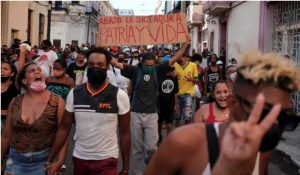The Cuban Parliament has passed a new Penal Code that threatens independent journalism in the country, as another advance in censoring the country’s press.
The law, which will take effect in up to three months, blocks foreign financing and includes new crimes, including disruption of public order, which includes penalties for acts “produced in groups or individually.”
Constitutional amendments are being made Ten months after Cuba registered mass protests against government measures during the covid-19 pandemic. They were the largest demonstrations in the country since the 1990s.
New law legitimizes censorship in Cuba
The Cuban National Assembly unanimously approved the new Penal Code in its extraordinary session on Sunday.
Rubén Remigio Ferro, President of the Supreme People’s Court, the highest authority in the judiciary in the country, stated that the new Penal Execution Law brings together “all existing regulations on the subject in the same legal entity”.
In this way, it legitimizes the pressure exerted by the regime on the citizens as well as the opposition, journalists and independent media outlets, and evaluates the newspaper. Cyber Cuba.
The new penal code enters into force within 90 days of publication in the Official Gazette and replaces the previous one, completing the Constitution ratified in 2019.
The presented document, of which 17 versions have been prepared, is the result of an extensive consultation process that allows for a fundamental enrichment of the original text. @RubenRemigioCU.
As a new direction, it established educational, preventive and coercive aims. pic.twitter.com/Pur4ZkFhbv
— President Cuba ???????? (@PresidenciaCuba) May 15, 2022
The Criminal Code update includes 37 new crimes. In addition to disrupting public order, “insulting” high-ranking public officials is punishable by up to three years in prison.
Cuban independent journalism is particularly affected by the ban on foreign funding for all citizens and companies in the country, including professionals and media outlets.
Persons who “support, encourage, finance, provide, receive or hold funds, material or financial resources that can be used to obtain financing” from non-governmental organizations or international organizations are sentenced to imprisonment of up to 10 years. Activities against the state and its constitutional order”.
read it too
Coalition demands governments pressure Cuba to end persecution of journalists
This Cyber Cuba He underlines that, unlike other constitutional amendments, this amendment will not be put to a public vote, and that it is a point questioned by opponents and members of civil society.
The Committee to Protect Journalists (CPJ) criticized the passage of the new Penal Code, calling it a “threat to independent media”.
Ana Cristina Núñez, CPJ’s representative for Latin America and the Caribbean, said that under the new law, Cuba “continues to establish a complex and perverse regime of legal censorship”.
“We are concerned about the passage of Cuba’s new penal code that further criminalizes the work of independent journalists on the island by banning foreign funding and putting its existence and sustainability at great risk.”
In late March, the independent feminist website Yo Si Te Creo Classified the new draft Penal Code in Cuba as unconstitutional and demanded a longer period of public consultation to develop it, Cyber Cuba.
For the group, the proposal violated the Cuban Constitution as it had “more negative aspects than positive aspects due to its high degree of criminalization and the ambiguity of its definitions”.
Another controversial point kept in the final version of the approved text is the “exceptional” death penalty for 23 types of crimes.
Although it was widely used in the 1960s, capital punishment has been applied in rare exceptions since the 2000s. Still, he was retained in the Criminal Code for “crimes against state security, terrorism, international drug trafficking, and murder.”
Cuba Under Censorship Is One of the Worst Countries for Journalism
Finally World Press Freedom Ranking According to the report by Reporters Without Borders (RSF), published on May 3, Cuba was ranked 174th out of 180 countries.
RSF noted that the island remains “the worst country for press freedom in Latin America every year.” This is because all Cuban media outlets are closely monitored by the government, as the privately owned press is banned by the Constitution.
“Independent journalists, on the other hand, are kept under surveillance by agents whose aim is to reduce their mobility, interrogate reporters, and erase their information,” the NGO says.
“Although bloggers and citizen-journalists see a space of freedom on the Internet, they surf at their own risk and are often arrested or forced into exile.
. In 2021, new regulations that clearly violate the rights to freedom of expression, information and association in the cyber world have made the principle of an open, free and inclusive internet even more distant.”
In addition to this scenario, the organization underlines that arrests, arbitrary detentions, persecution and harassment are part of the daily lives of Cuban and foreign journalists, and that if they are deemed “too negative” about the situation, they risk deportation. diet.
read it too
source: Noticias
